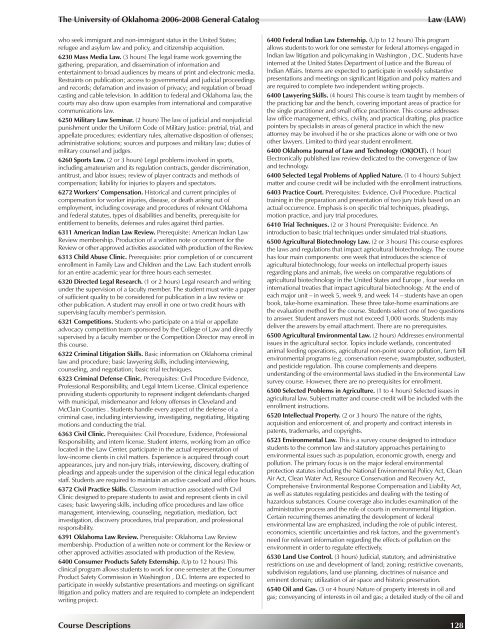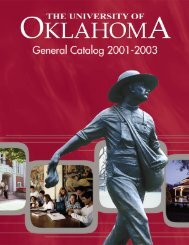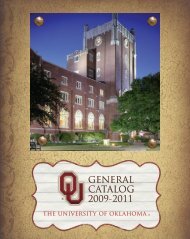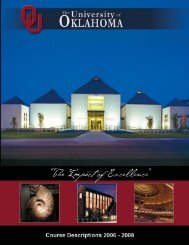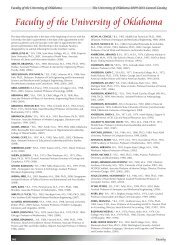2006-08 Course Descriptions - Catalog - University of Oklahoma
2006-08 Course Descriptions - Catalog - University of Oklahoma
2006-08 Course Descriptions - Catalog - University of Oklahoma
You also want an ePaper? Increase the reach of your titles
YUMPU automatically turns print PDFs into web optimized ePapers that Google loves.
The Uni ver sity <strong>of</strong> <strong>Oklahoma</strong> <strong>2006</strong>-20<strong>08</strong> Gen eral Cat a logLaw (LAW)who seek immigrant and non-immigrant status in the United States;refugee and asylum law and policy, and citizenship acquisition.6230 Mass Media Law. (3 hours) The legal frame work governing thegathering, preparation, and dissemination <strong>of</strong> information andentertainment to broad audiences by means <strong>of</strong> print and electronic media.Restraints on publication; access to governmental and judicial proceedingsand records; defamation and invasion <strong>of</strong> privacy; and regulation <strong>of</strong> broadcasting and cable television. In addition to federal and <strong>Oklahoma</strong> law, thecourts may also draw upon examples from international and comparativecommunications law.6250 Military Law Seminar. (2 hours) The law <strong>of</strong> judicial and nonjudicialpunishment under the Uniform Code <strong>of</strong> Military Justice: pretrial, trial, andappellate procedures; evidentiary rules, alternative disposition <strong>of</strong> <strong>of</strong>fenses;administrative solutions; sources and purposes and military law; duties <strong>of</strong>military counsel and judges.6260 Sports Law. (2 or 3 hours) Legal problems involved in sports,including amateurism and its regulation contracts, gender discrimination,antitrust, and labor issues; review <strong>of</strong> player contracts and methods <strong>of</strong>compensation; liability for injuries to players and spectators.6272 Workers’ Compensation. Historical and current principles <strong>of</strong>compensation for worker injuries, disease, or death arising out <strong>of</strong>employment, including coverage and procedures <strong>of</strong> relevant <strong>Oklahoma</strong>and federal statutes, types <strong>of</strong> disabilities and benefits, prerequisite forentitlement to benefits, defenses and rules against third parties.6311 American Indian Law Review. Prerequisite: American Indian LawReview membership. Production <strong>of</strong> a written note or comment for theReview or other approved activities associated with production <strong>of</strong> the Review.6313 Child Abuse Clinic. Prerequisite: prior completion <strong>of</strong> or concurrentenrollment in Family Law and Children and the Law. Each student enrollsfor an entire academic year for three hours each semester.6320 Directed Legal Research. (1 or 2 hours) Legal research and writingunder the supervision <strong>of</strong> a faculty member. The student must write a paper<strong>of</strong> sufficient quality to be considered for publication in a law review orother publication. A student may enroll in one or two credit hours withsupervising faculty member’s permission.6321 Competitions. Students who participate on a trial or appellateadvocacy competition team sponsored by the College <strong>of</strong> Law and directlysupervised by a faculty member or the Competition Director may enroll inthis course.6322 Criminal Litigation Skills. Basic information on <strong>Oklahoma</strong> criminallaw and procedure; basic lawyering skills, including interviewing,counseling, and negotiation; basic trial techniques.6323 Criminal Defense Clinic. Prerequisites: Civil Procedure Evidence,Pr<strong>of</strong>essional Responsibility, and Legal Intern License. Clinical experienceproviding students opportunity to represent indigent defendants chargedwith municipal, misdemeanor and felony <strong>of</strong>fenses in Cleveland andMcClain Counties . Students handle every aspect <strong>of</strong> the defense <strong>of</strong> acriminal case, including interviewing, investigating, negotiating, litigatingmotions and conducting the trial.6363 Civil Clinic. Prerequisites: Civil Procedure, Evidence, Pr<strong>of</strong>essionalResponsibility, and intern license. Student interns, working from an <strong>of</strong>ficelocated in the Law Center, participate in the actual representation <strong>of</strong>low-income clients in civil matters. Experience is acquired through courtappearances, jury and non-jury trials, interviewing, discovery, drafting <strong>of</strong>pleadings and appeals under the supervision <strong>of</strong> the clinical legal educationstaff. Students are required to maintain an active caseload and <strong>of</strong>fice hours.6372 Civil Practice Skills. Classroom instruction associated with CivilClinic designed to prepare students to assist and represent clients in civilcases; basic lawyering skills, including <strong>of</strong>fice procedures and law <strong>of</strong>ficemanagement, interviewing, counseling, negotiation, mediation, factinvestigation, discovery procedures, trial preparation, and pr<strong>of</strong>essionalresponsibility.6391 <strong>Oklahoma</strong> Law Review. Prerequisite: <strong>Oklahoma</strong> Law Reviewmembership. Production <strong>of</strong> a written note or comment for the Review orother approved activities associated with production <strong>of</strong> the Review.6400 Consumer Products Safety Externship. (Up to 12 hours) Thisclinical program allows students to work for one semester at the ConsumerProduct Safety Commission in Washington , D.C. Interns are expected toparticipate in weekly substantive presentations and meetings on significantlitigation and policy matters and are required to complete an independentwriting project.6400 Federal Indian Law Externship. (Up to 12 hours) This programallows students to work for one semester for federal attorneys engaged inIndian law litigation and policymaking in Washington , D.C. Students haveinterned at the United States Department <strong>of</strong> Justice and the Bureau <strong>of</strong>Indian Affairs. Interns are expected to participate in weekly substantivepresentations and meetings on significant litigation and policy matters andare required to complete two independent writing projects.6400 Lawyering Skills. (4 hours) This course is team taught by members <strong>of</strong>the practicing bar and the bench, covering important areas <strong>of</strong> practice forthe single practitioner and small <strong>of</strong>fice practitioner. This course addresseslaw <strong>of</strong>fice management, ethics, civility, and practical drafting, plus practicepointers by specialists in areas <strong>of</strong> general practice in which the newattorney may be involved if he or she practices alone or with one or twoother lawyers. Limited to third year student enrollment.6400 <strong>Oklahoma</strong> Journal <strong>of</strong> Law and Technology (OKJOLT). (1 hour)Electronically published law review dedicated to the convergence <strong>of</strong> lawand technology.6400 Selected Legal Problems <strong>of</strong> Applied Nature. (1 to 4 hours) Subjectmatter and course credit will be included with the enrollment instructions.6403 Practice Court. Prerequisites: Evidence, Civil Procedure. Practicaltraining in the preparation and presentation <strong>of</strong> two jury trials based on anactual occurrence. Emphasis is on specific trial techniques, pleadings,motion practice, and jury trial procedures.6410 Trial Techniques. (2 or 3 hours) Prerequisite: Evidence. Anintroduction to basic trial techniques under simulated trial situations.6500 Agricultural Biotechnology Law. (2 or 3 hours) This course exploresthe laws and regulations that impact agricultural biotechnology. The coursehas four main components: one week that introduces the science <strong>of</strong>agricultural biotechnology, four weeks on intellectual property issuesregarding plans and animals, five weeks on comparative regulations <strong>of</strong>agricultural biotechnology in the United States and Europe , four weeks oninternational treaties that impact agricultural biotechnology. At the end <strong>of</strong>each major unit – in week 5, week 9, and week 14 – students have an openbook, take-home examination. These three take-home examinations arethe evaluation method for the course. Students select one <strong>of</strong> two questionsto answer. Student answers must not exceed 1,000 words. Students maydeliver the answers by email attachment. There are no prerequisites.6500 Agricultural Environmental Law. (2 hours) Addresses environmentalissues in the agricultural sector. Topics include wetlands, concentratedanimal feeding operations, agricultural non-point source pollution, farm billenvironmental programs (e.g. conservation reserve, swampbuster, sodbuster),and pesticide regulation. This course complements and deepensunderstanding <strong>of</strong> the environmental laws studied in the Environmental Lawsurvey course. However, there are no prerequisites for enrollment.6500 Selected Problems in Agriculture. (1 to 4 hours) Selected issues inagricultural law. Subject matter and course credit will be included with theenrollment instructions.6520 Intellectual Property. (2 or 3 hours) The nature <strong>of</strong> the rights,acquisition and enforcement <strong>of</strong>, and property and contract interests inpatents, trademarks, and copyrights.6523 Environmental Law. This is a survey course designed to introducestudents to the common law and statutory approaches pertaining toenvironmental issues such as population, economic growth, energy andpollution. The primary focus is on the major federal environmentalprotection statutes including the National Environmental Policy Act, CleanAir Act, Clean Water Act, Resource Conservation and Recovery Act,Comprehensive Environmental Response Compensation and Liability Act,as well as statutes regulating pesticides and dealing with the testing <strong>of</strong>hazardous substances. <strong>Course</strong> coverage also includes examination <strong>of</strong> theadministrative process and the role <strong>of</strong> courts in environmental litigation.Certain recurring themes animating the development <strong>of</strong> federalenvironmental law are emphasized, including the role <strong>of</strong> public interest,economics, scientific uncertainties and risk factors, and the government’sneed for relevant information regarding the effects <strong>of</strong> pollution on theenvironment in order to regulate effectively.6530 Land Use Control. (3 hours) Judicial, statutory, and administrativerestrictions on use and development <strong>of</strong> land; zoning; restrictive covenants,subdivision regulations, land use planning, doctrines <strong>of</strong> nuisance andeminent domain; utilization <strong>of</strong> air space and historic preservation.6540 Oil and Gas. (3 or 4 hours) Nature <strong>of</strong> property interests in oil andgas; conveyancing <strong>of</strong> interests in oil and gas; a detailed study <strong>of</strong> the oil and<strong>Course</strong> <strong>Descriptions</strong> 128


